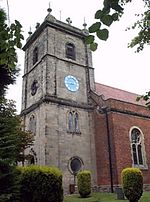Congerstone

Congerstone () is a village and former civil parish, now in the parish of Shackerstone, in the Hinckley and Bosworth district, in Leicestershire, England. It is three miles north west of Market Bosworth, of which it was historically a daughter parish. It is near the Ashby-de-la-Zouch Canal and the A444 road. In 1931 the parish had a population of 209.The Grade II* listed parish church of St Mary the Virgin dates back to 1179, although the current building is largely from the 16th century and was remodelled in the 19th century. The patron of the church was formerly the Curzon family of Earl Howe who also helped fund the village school. The church includes a monument by Sir George Frampton, dedicated to Georgiana, Countess Howe, first wife of Richard Curzon, 4th Earl Howe. The village has one school, Congerstone Primary School, on Shackerstone Road.
Excerpt from the Wikipedia article Congerstone (License: CC BY-SA 3.0, Authors, Images).Congerstone
Bilstone Road, Hinckley and Bosworth
Geographical coordinates (GPS) Address Nearby Places Show on map
Geographical coordinates (GPS)
| Latitude | Longitude |
|---|---|
| N 52.64 ° | E -1.46 ° |
Address
Bilstone Road
CV13 6LG Hinckley and Bosworth
England, United Kingdom
Open on Google Maps










